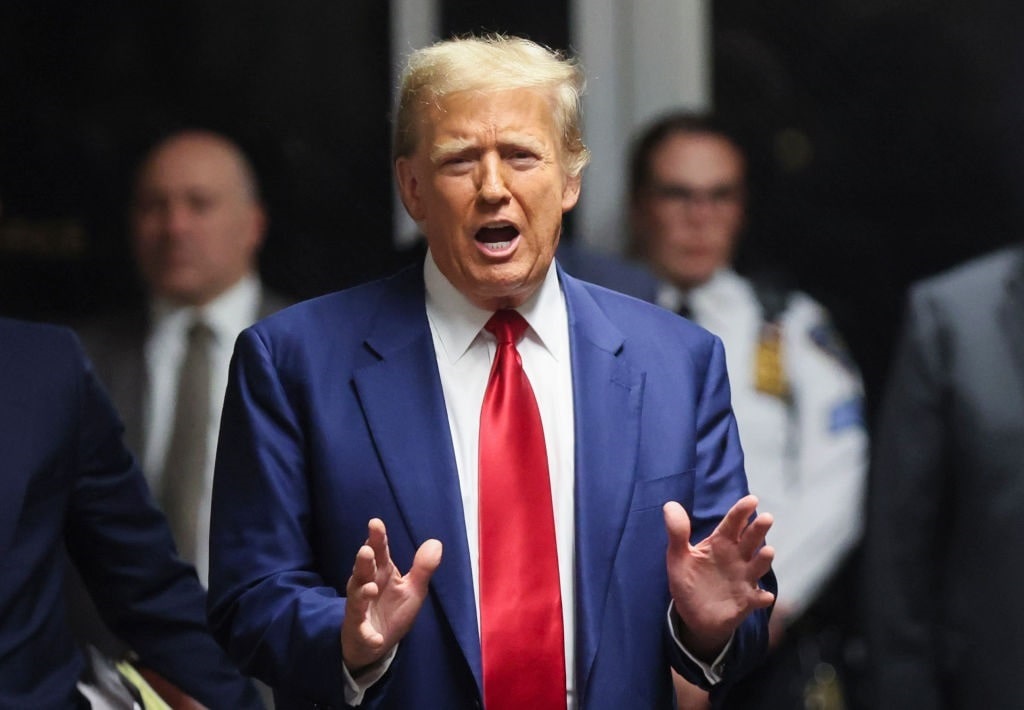James Bond author Ian Fleming wrote: “Once is happenstance. Twice is coincidence. Three times is enemy action.” The sudden swell of media stories declaring that former President Donald Trump is trying to position himself as a Messiah come to save America certainly seems to fit the bill of Fleming’s third occurrence. A deluge of articles denouncing the GOP frontrunner for – with scant evidence – attempting to portray himself as the savior of the nation is gaining prominence. However, the real target is not Trump but rather the key evangelical demographic that supports his candidacy.
A Smorgasbord of Messianic Trump Fiction
Just last month, articles from Reuters, Axios, The Independent, The Economic Times, and The New York Times all supped from the same well and decided the anti-Trump waters were worthy of dissemination. Each painted the former president as a man seeking to dupe gullible Christians into a transference of trust or warned of preachers who conflate Trump with a savior figure. Here’s a selection of headlines from recent weeks:
- “Christian TV evangelicals fire up Trump support with messianic message” – Reuters
- “Trump’s Bibles and the evolution of his messianic message” – Axios
- “2024 US Presidential Election: Is Donald Trump using Christianity in his political campaign?” – The Economic Times
- “The Church of Trump: How He’s Infusing Christianity Into His Movement” – The New York Times
What these pieces – and many others – have in common is claiming the former president is trying to position himself as a new Messiah. What they lack, however, is proof that he is doing any such thing.
Where’s the Evidence?
Although the author of The Times article tries to paint Trump as secretly keen to take up the messianic moniker, the evidence presented – and indeed the author’s own words – suggest otherwise:
“[W]hile Mr. Trump is eager to maintain the support of evangelical voters and portray his presidential campaign as a battle for the nation’s soul, he has mostly been careful not to speak directly in messianic terms.”
So, just to be clear, he has never spoken in “messianic terms.” Indeed, the author noted that in 2021 Trump said specifically, “This country has a savior, and it’s not me – that’s someone much higher up than me.”
 And then there is the idea that the “soul of the nation” is a refrain used exclusively by Trump. But what about the imagery used by the sitting president? A balanced view might include his remarks from a couple of years ago. Many political watchers remember the dark speech of September 2022, set in front of the red-lit backdrop of Independence Hall in Philadelphia. Flanked by two uniformed marines, President Joe Biden delivered a harsh condemnation of Trump voters that even Washington, DC’s well-known newspaper criticized as highly partisan.
And then there is the idea that the “soul of the nation” is a refrain used exclusively by Trump. But what about the imagery used by the sitting president? A balanced view might include his remarks from a couple of years ago. Many political watchers remember the dark speech of September 2022, set in front of the red-lit backdrop of Independence Hall in Philadelphia. Flanked by two uniformed marines, President Joe Biden delivered a harsh condemnation of Trump voters that even Washington, DC’s well-known newspaper criticized as highly partisan.
This speech was titled “Battle for the Soul of the Nation,” a term Biden has used numerous times since, especially in relation to elections. To suggest that this common refrain is specific codified language from Trump to his followers is a huge stretch of the imagination.
The author is clearly a talented writer with a turn of phrase that readers of any political persuasion can admire. For example:
“Mr. Trump’s ability to turn his supporters’ passion into piety is crucial to understanding how he remains the undisputed Republican leader despite guiding his party to repeated political failures and while facing dozens of felony charges in four criminal cases. His success at portraying those prosecutions as persecutions — and warning, without merit, that his followers could be targeted next — has fueled enthusiasm for his candidacy and placed him, once again, in a position to capture the White House.”
The well-crafted alliterations suggest weight and substance, and yet many of the multiple prosecutions of Trump, both civil and criminal, have at least the stench of politics about them. To suggest that there is no political animus behind them is to ignore the statements and actions of those who have brought the charges. New York Attorney General Letitia James ran her whole campaign on “Get Trump.” The 45th president has been charged with novel applications of the law that have never been applied anywhere to anyone.
Whose Cult Is It Anyway?
Below the surface of the false prophet Trump storyline is an undercurrent that suggests those who buy into the demonstrably false narrative are essentially in a cult. Indeed, Trump as Cult Leader is a refrain we have heard from the media since 2016. Forbes, The Atlantic, The Hill, and Washington, DC’s most notable publication have all described the former president as helming his own MAGA cult. Vanity Fair even asked with its 2021 headline: “Can Trump’s Cult of Followers Be Deprogrammed?”

(Photo by Peter Zay/Anadolu via Getty Images)
While various groups offer different warning signs of what makes a cult, there are a few constant crossovers. For example, if you go against the tenets of the group, you become isolated. Now consider the “exclusivity” of the progressive left, where failure to abide by strict language codes (“newcomers” vs “illegal immigrants”) and acceptance of “traditional” ideas (such as there are only two genders) will see those who run afoul ostracized and vilified.
Trump’s MAGA movement may have its own shibboleths and mores, but, despite the Fourth Estate accusations of hatred and intolerance, it tends to welcome anybody who is willing to get on board.
In fact, it seems that Trump’s fairly traditional outlook has put him in the linguistic crosshairs of the perpetually offended chattering classes.
Forget Humility!
While the authors of these verbal insinuations lament that Trump is asking God for help and guidance, no such inspection is given to Biden, whose team portrays him as someone who has all the answers and solutions. Look at the broken southern border, sanctuary cities on the verge of fiscal collapse, an economy still reeling from unrelenting inflation – and one might assume that Biden et al. would take help from any quarter they can get it.
It seems that what irks the authors is that Trump has refused to be “modern” in an age when the “olds” – much as in Mao Zedong’s Cultural Revolution – are thought at best gauche and at worst a holdover from an evil and bitter time. But perhaps America does not want the “progress” being offered through forced language obedience and social re-education. Perhaps the American people would rather look to God to guide them than central planners and narcissists obsessed with the self and the dim guiding light of the next election.
Trump is certainly not perfect. But isn’t the search for the right answer why people ask for help from a higher power? It is – as history often demonstrates – those claiming to have all the solutions for radical change who pose the greatest threat to peace and stability.




